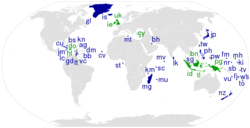| Revision as of 22:40, 15 May 2007 edit72.143.130.79 (talk)No edit summary← Previous edit | Revision as of 01:53, 16 May 2007 edit undoSmith Jones (talk | contribs)5,086 editsm I HAVE FUCKING HAD IT WITH THE VANDLISM STOP NOW OR I'LL GTL ADMIN AND MAYB YOU'RE IP ADDRESS BANNED YOU DUMBASSNext edit → | ||
| Line 3: | Line 3: | ||
| An '''island country''' is a ] that is wholly confined to an ] or ], and has no territory on the ] of a ]. Forty-seven of the world's countries are island countries, including most of the smallest ones. | An '''island country''' is a ] that is wholly confined to an ] or ], and has no territory on the ] of a ]. Forty-seven of the world's countries are island countries, including most of the smallest ones. | ||
| Island countries can be divided in two approximate groups. One group comprises those that are large, relatively populous, and usually close to a ]. These include ], ], the ], ], the ]. ] can be considered this category of country taken to an extreme: an island country so large it is considered a ]. | Island countries can be divided in two approximate groups. One group comprises those that are large, relatively populous, and usually close to a ]. These include ], ], the ], ], the ], ] and ]. The largest member of this group, and the world's largest island country, is ]. These countries typically share cultural and political similarities with their continental neighbours. Their island status has sometimes been an important advantage that has isolated them from invasion and made them important in regional trade because of their locations and the maritime abilities of the population. ] can be considered this category of country taken to an extreme: an island country so large it is considered a ]. | ||
| The other group comprises smaller island countries such as ], the ], the ], ], and the ]. These countries tend to be very different from continental countries. Their small size usually means there is little agricultural land and rarely many ]s. However, in modern times, smaller island countries around the world have become centres for ], which in many is the dominant industry. | The other group comprises smaller island countries such as ], the ], the ], ], and the ]. These countries tend to be very different from continental countries. Their small size usually means there is little agricultural land and rarely many ]s. However, in modern times, smaller island countries around the world have become centres for ], which in many is the dominant industry. | ||
Revision as of 01:53, 16 May 2007
| It has been suggested that Borderless country be merged into this article. (Discuss) Proposed since September 2006. |

An island country is a country that is wholly confined to an island or island group, and has no territory on the mainland of a continent. Forty-seven of the world's countries are island countries, including most of the smallest ones.
Island countries can be divided in two approximate groups. One group comprises those that are large, relatively populous, and usually close to a continent. These include Japan, Sri Lanka, the Philippines, Cuba, the United Kingdom, Iceland and Madagascar. The largest member of this group, and the world's largest island country, is Indonesia. These countries typically share cultural and political similarities with their continental neighbours. Their island status has sometimes been an important advantage that has isolated them from invasion and made them important in regional trade because of their locations and the maritime abilities of the population. Australia can be considered this category of country taken to an extreme: an island country so large it is considered a continent.
The other group comprises smaller island countries such as Cyprus, the Comoros, the Bahamas, Tonga, and the Maldives. These countries tend to be very different from continental countries. Their small size usually means there is little agricultural land and rarely many natural resources. However, in modern times, smaller island countries around the world have become centres for tourism, which in many is the dominant industry.
Some island countries are centered on one or two major islands, such as the United Kingdom. Others are spread out over hundreds or thousands of smaller islands, such as Indonesia or the Maldives. Some island countries share their islands with other countries; these include the Republic of Ireland, Hispaniola ( Haiti and Dominican Republic ), Saint Martin and Papua New Guinea.
See also
- List of island countries
- List of islands (by country)
- List of countries